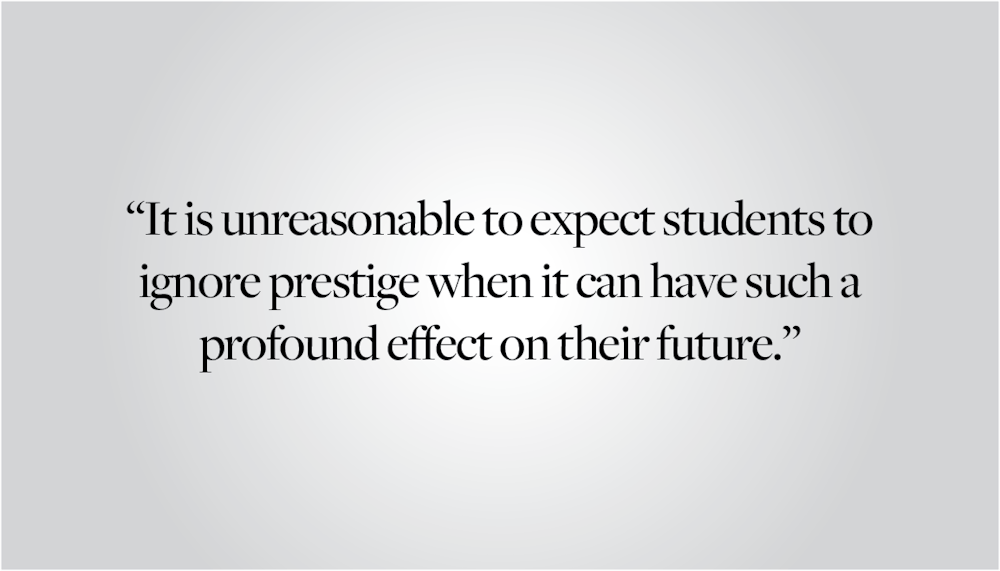Each year when U.S. News and World Report updates its college ranking list, calls for colleges to end their participation grow stronger. Critics of the rankings argue that students are misled by their arbitrary criteria, causing many to ignore which school is best for them in favor of prestige.
In response to these problems, many, such as the Editorial Page Board and fellow Herald columnist Tas Rahman ’26, have argued that rankings are counterproductive and that Brown should stop participating in them. While rankings can be problematic, they are not the root cause of the effects associated with them. And the harms of Brown not participating in rankings may ultimately outweigh the benefits.
Many blame U.S. News for leading students to prioritize rank over fit when choosing which college to attend. But a recent report concluded that only 5% of prospective students thought they could identify the U.S. News ranking of their first-choice school, indicating that rank may not be as important to students as critics suggest.
The uncomfortable reality is that rankings are only a small part of the over-glamorization of schools that are widely considered prestigious. A desire for prestige is practically hardwired into us. When asked what the best university in the country is, Americans have overwhelmingly answered with the Ivy League and its peer institutions. While U.S. News acts as a quantification of college rank or prestige, we already have our own predetermined ideas of the world’s best schools which we can’t escape.
Many critics argue that rankings are overblown. Even the president of Princeton, Christopher Eisgruber, wrote that rankings are a “slightly daft obsession that does harm when colleges, parents or students take (them) too seriously.” But while no student is doomed in life because they did not attend a prestigious college, where one graduates from does matter more than many are willing to admit, and studies that conclude otherwise frequently omit key details.
For example, a write-up of an annual report by a Dartmouth professor attempts to downplay the importance of a prestigious degree by stating that “only” 11.8% of this year’s Fortune 500 CEOs attended an Ivy League institution as an undergraduate. This framing neglects the fact that schools educating no more than 0.4% of students are massively overrepresented in this respect — especially considering around half of Americans do not have a college degree.
There are real advantages to attending a renowned school. Median earnings of Ivy League students 10 years after graduation are double the national average, and one of the biggest advantages isn’t at all related to the quality of education received: It’s simply that an Ivy League diploma can open doors for the rest of one’s life. And when the U.S. News rankings list Ivies at the top, the reputation of these schools is reaffirmed year after year, helping students impress employers post-graduation.
Whether or not this cycle is problematic is a hotly debated question. Some claim it serves to overemphasize institutional wealth and historic prestige, while others consider it fair to reward the students of prestigious colleges in this way. But regardless of the answer to the question, it is unreasonable to expect students to ignore prestige when it can have such a profound effect on their future in today’s society.
While Rahman writes that he did not choose Brown because of U.S. News’s rankings, it is impossible to ignore the role a school’s reputation plays in determining where students ultimately matriculate. Rahman’s individual decision was due to “unique academic programs, campus vibe and strong financial aid,” but I have met many other students that chose Brown in part because of the clout associated with the school. Perhaps they did not specifically read U.S. News, but prestige informed their decision regardless.
This leads me to largely oppose removing Brown from rankings. Whether or not we participate, people’s perceptions and assumptions regarding the top schools will not change. If anything, Brown’s position as a top-ranked college in U.S. News publications can only benefit Brown students in the long run by adding to the allure of a Brown degree.
There are unfortunately no easy solutions to the issues critics say college rankings cause, as our own perceptions of top schools are the root of the problem. Even if rankings are ignored, as Rahman proposes, students will continue to be influenced by the status that accompanies attending an elite school and the career benefits associated with them. The effects Rahman draws attention to will remain present.
College rankings can be problematic. But unless we’re collectively willing to treat the Ivy League like an otherwise unremarkable group of eight colleges, the trickle-down effects of prestige are here to stay.
Lucas Guan ’27 can be reached at lucas_guan@brown.edu. Please send responses to this opinion to letters@browndailyherald.com and other op-eds to opinions@browndailyherald.com.





